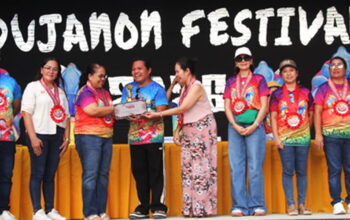
GOV. Erico Aristotle Aumentado said the issue involving the Chocolate Hills Natural Monument “is not just an environmental issue but also a social issue.”
The governor emphasized this in his opening statement during the Senate Committee on Natural Resources chaired by Sen. Cynthia Villar. Aside from Villar, also present were Senators Nancy Binay, Loren Legarda, Rafael Tulfo and Ronald de la Rosa.
“As public servants at the helm of the provincial government, we take our responsibility seriously to preserve the natural wonders of our province so that the next generation can enjoy them as well,” he pointed out.
Aumentado expressed appreciation for active advocates for environment, concerned citizens and civil society organizations “who keep government in check and help shape public policy.”
While tourists have been coming to the province before it was designated as a Global Geopark by UNESCO, he said being a geopark gives Bohol an “added advantage” in the world tourism industry.
In the midst of all these, Aumentado said “we should not overlook the needs and rights of the people residing and living within the protected areas and whose livelihood and means of income are dependent upon the land.” “Thus, there is a need to balance between environmental protection and the right of the people to improve their condition,” the governor stressed.
Aumentado recalled that 25 years ago, Bohol was among the top 20 poorest provinces in the country.
Bohol was also the hotbed of communist insurgents blaming government neglect as the cause of their poverty.
“Our leaders then made poverty reduction a primary objective thru agriculture and tourism as economic drivers,” he added.
Several years later, the governor said Bohol is out of the poorest provinces list, and was declared insurgent free by the Armed Forces of the Philippines in 2010. Aumentado said Boholanos are aiming for inclusive growth – not only the big and rich hotels, resorts, restaurants and food chains will benefit from Bohol’s tourism industry.
He expressed his desire that the barangay folks, the carenderia owners, kakanin peddlers and other small and medium entrepreneurs to also ride on the train of development.
“We don’t want to kill the goose that lays the golden egg. Much as we want to see the lives of Boholanos improve, we don’t want it to be at the cost of destroying our environment or to ‘uglify’ lovely sceneries of our province,” he noted.
While the closure of the resort was a victory for environmentalists, Aumentado said it also casts a shadow on the livelihood of those employed there and the economic aspirations of the local community.
“It is a brutal reminder that every environmental decision is also a social one, affecting real people with real needs,” the governor pointed out. Aumentado concluded that “the challenge, therefore, is not just to protect our environment but to do so while nurturing the social fabric of our communities.”


